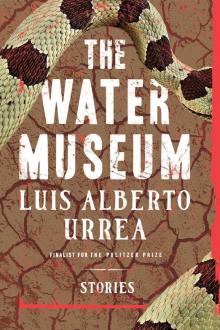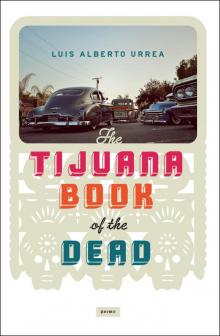- Home
- Luis Alberto Urrea
Into the Beautiful North
Into the Beautiful North Read online
Copyright © 2009 by Luis Alberto Urrea
Spanish translation copyright © 2009 by Enrique Hubbard Urrea
All rights reserved. Except as permitted under the U.S. Copyright Act of 1976, no part of this publication may be reproduced, distributed, or transmitted in any form or by any means, or stored in a database or retrieval system, without the prior written permission of the publisher.
Little, Brown and Company
Hachette Book Group
237 Park Avenue, New York, NY 10017
Visit our Web site at www.HachetteBookGroup.com
www.twitter.com/littlebrown
First eBook Edition: May 2009
Little, Brown and Company is a division of Hachette Book Group, Inc. The Little, Brown name and logo are trademarks of Hachette Book Group, Inc.
The characters and events in this book are fictitious. Any similarity to real persons, living or dead, is coincidental and not intended by the author.
ISBN: 978-0-316-05340-2
Contents
Copyright Page
Sur
Chapter One
Chapter Two
Chapter Three
Chapter Four
Chapter Five
Chapter Six
Chapter Seven
Chapter Eight
Chapter Nine
Chapter Ten
Chapter Eleven
Chapter Twelve
Chapter Thirteen
Chapter Fourteen
Chapter Fifteen
Chapter Sixteen
Chapter Seventeen
Norte
Chapter Eighteen
Chapter Nineteen
Chapter Twenty
Chapter Twenty-one
Chapter Twenty-two
Chapter Twenty-three
Chapter Twenty-four
Chapter Twenty-five
Chapter Twenty-six
Chapter Twenty-seven
Chapter Twenty-eight
Chapter Twenty-nine
Chapter Thirty
Chapter Thirty-one
Chapter Thirty-two
Chapter Thirty-three
Chapter Thirty-four
Chapter Thirty-five
Chapter Thirty-six
Epilogue
Acknowledgments
About the Author
OTHER BOOKS BY Luis Alberto Urrea
Fiction
The Hummingbird’s Daughter
In Search of Snow
Six Kinds of Sky
Nonfiction
The Devil’s Highway: A True Story
Across the Wire: Life and Hard Times on the Mexican Border
By the Lake of Sleeping Children: The Secret Life of the Mexican Border
Nobody’s Son
Wandering Time
Poetry
The Fever of Being
Ghost Sickness
Vatos
for Megan
O friends, I have come searching for you,
I crossed over flowering fields,
And here, at last, I’ve found you.
Rejoice.
Tell me your stories.
O friends, I am here.
— XAYACAMACH OF TIZATLÁN
Sur
Chapter One
The bandidos came to the village at the worst possible time. Of course, everyone in Mexico would agree that there is no particularly good time for bad men to come to town. But Tres Camarones was unguarded on that late summer’s day when so many things had already changed. And everything that remained was about to change forever.
Nobody in the village liked change. It had taken great civic upheaval to bring electricity to Tres Camarones, for example. Until 1936, ice came in big trucks, and fathers took their sons to observe it when it slid down the ramps in great clear blocks. It took the visionary mayor, Garcí a-García the First, to see the potential in electrical power, and he had lobbied for two years to have the wires strung from far Villaunión. Still, there were holdouts a good decade after Tres Camarones had begun to glow with yellow light. Such stalwarts relied on candles, kerosene lamps, and small bonfires in the street. These blazes, though festive, blocked the scant traffic and the trucks bearing beer and sides of beef, and Garcí a-García had to resort to the apocalyptic stratagem of banning street fires entirely. Denounced as an Antichrist, he was promptly defeated in the next election. Later, he was reelected: even if his policies had been too modernizing for some, the residents of Tres Camarones realized that a new mayor meant change, and change was the last thing they wanted. Progress might be inevitable, but there was no reason they should knuckle under without a fight.
True, the occasional hurricane devastated the low-lying forest and semitropical jungles and reformed the beaches. Often, parts of the town were washed away or carried out to sea. But the interior clock of evolution in Tres Camarones was set only to these cataclysms of nature.
And then, the peso dropped in value. Suddenly there was no work. All the shrimp were shipped north, tortillas became too expensive to eat, and people started to go hungry. We told you change was bad, the old-timers croaked.
Nobody had heard of the term immigration. Migration, to them, was when the tuna and the whales cruised up the coast, or when Guacamaya parrots flew up from the south. Traditionalists voted to revoke electricity, but it was far too late for that. No woman in town would give up her refrigerator, her electric fan, or her electric iron. So the men started to go to el norte. Nobody knew what to say. Nobody knew what to do. The modern era had somehow passed Tres Camarones by, but this new storm had found a way to siphon its men away, out of their beds and into the next century, into a land far away.
The bandidos came with the sunrise, rolling down the same eastern road that had once brought the ice trucks. There were two of them. They had to drive south from Mazatlán, which was at least an hour and forty minutes away, then creak off the highway and take the cutoff toward the coast. Explosions of parrots, butterflies, and hummingbirds parted before them. They didn’t notice.
One of them was an agent of the Policía Estatal, the dreaded Sinaloa State Police. He earned $150 a month as a cop. The drug cartel in the north of the state paid him $2,500 a month as an advisory fee. He got a $15,000 bonus each Christmas.
The other was a bottom-level narco who, nevertheless, was the state cop’s boss. What he needed to really get ahead in his game was a territory to call his own, but the cartel had the state sewn up, and there was no room for him in Baja California, Sonora, or Chihuahua. He had hit the drug gangster’s glass ceiling and it irked him, because he looked so damned good. The boys called him Scarface. He liked that. In spite of the awful heat and soggy air of the coastal swamplands, he wore a white sport jacket and regarded the world through mirrored sunglasses, sucking on a cinnamon toothpick.
Neither of the two bandidos enjoyed this bucolic trip to the bottomlands. But the one in the jacket had gotten a cell phone call from Culiacán that there were gringo surfos camping on the beach who were in need of some bud. He shook his head as he looked out at the stupid mango trees: all this trouble for marijuana. “It’s a job,” Scarface said. The cop snorted.
Scarface wore his irritating chrome .45 automatic in a shoulder rig. It made his armpit and ribs into a swamp of perspiration. It was against the law for a Mexican to carry an automatic weapon, though he didn’t even think about it. His partner wore a uniform and had a heavy Bulldog .44 in a Sam Browne holster—the narco could smell its leather and was irritated by its squeaking as the car bumped along the bad road.
The holster squeak was the closest they could get to a theme song. There was nothing on the radio out here except the crappy Mexican music on AM.
“Me gusta
Kanye West,” the narco said, snapping off the radio.
The state cop said, “Diddy es mejor.”
“¡Diddy!” cried Scarface.
They argued for a few moments.
Soon, they reverted to silence. The cop turned up the AC. His gun belt squealed.
“Dios mío,” Scarface sighed. “I hate the country.”
The men kept their windows rolled up, but they could still smell the ripe effluent of mud and clams and pigsties and spawning fish in green water. They wrinkled their noses. “What is that?” the cop asked. “Boiling mangos?” They shook their heads, greatly offended. The other one pointed.
“Outhouses!” he scoffed.
They couldn’t believe it! These towns were so backward, Emiliano Zapata and a bunch of revolutionaries could ride through at any moment and fit right in. The bandidos, a generation removed from outhouses, sneered at the skinny dogs and the absurd starving roosters that panicked as the car rolled over oyster shells and brushed aside sugarcane and morning glory vines. The rubes down here had apparently never heard of blacktop. It was all dirt roads and cobblestones. No tourists.
They were slightly pleased, yet jealous, when they noted one of the small houses had a satellite dish.
As in most neighborhoods of most tropical Mexican villages, the walls of the homes in town went right to the edge of the street. Walls were wavery and one block long, and several doors could be found in each. Each door denoted another address. The windows had big iron railings and wooden shutters. Bougainvillea cascaded from several rooflines. Trumpet flowers. Lantana. The bandidos knew that the back of each house was a courtyard with a tree and an open kitchen and some chickens and an iguana or two. Laundry. On the street side, the walls were great splashes of color. One address might be white, and the next might be pale blue and the next vivid red with a purple door. Sometimes, two primary colors were divided by a bright green drainpipe or a vibrating line where the colors clashed and the human eye began to rattle in its socket.
The big police LTD rolled down the streets like a jaguar sniffing for its prey. The two visitors came out of the narrow alleys into the open space of the town plazuela, a tawdry gazebo and a bunch of trees with their trunks whitewashed. On the other side of the square, they spied a restaurant: TAQUERIA E INTERNET “LA MANO CAIDA.”
“The Fallen Hand Taco Shop? What kind of name is that?” the cop asked.
“It’s an Internet café, too,” the narco reminded him.
“Jesus Christ.”
“Let’s get out of here quick,” his partner said. “I want to catch the beisbol game in Mazatlán tonight.” He spit out his toothpick.
They creaked to a halt and could hear the music blasting out of the Fallen Hand before they even opened the car’s doors.
Chapter Two
Here came Nayeli, late for work again, dancing through town on her way to the Fallen Hand. She didn’t mean to dance—it was just that everywhere she went, she swung and swayed, and it was all she could do to keep herself from running. She had been the star forward of the Tres Camarones girls’ soccer team for four years, and even though she’d been out of high school for a year, she was still in shape. Her dark legs were hard with muscle and she still wore her tiny school uniform skirt, so everybody could admire them. Besides, clothes didn’t grow on trees.
Nayeli was dreaming of leaving town again. She wanted to see anything, everything. Wanted to go where lights changed color, where airplanes lumbered overhead and the walls of great buildings were covered in television screens like in that Bill Murray Japanese movie they’d seen at the Cine Pedro Infante the week before. She wanted shimmering lines of traffic in city rain. She was eager to see a concert, ride a train, wear fancy clothes, and sip exotic coffees on a snowy boulevard. She had seen elevators in a thousand movies, and she longed to ride one, though not on the roof of one like Jackie Chan.
Sometimes, she dreamed of going to the United States—“Los Yunaites,” as the people of the town called them—to find her father, who had left and never come back. He traded his family for a job, and then he stopped writing or sending money. She didn’t like to think about him. People kidded her that she never stopped smiling, and it made her look flirty, but thinking about him made the smile fade. She walked faster.
Nayeli was coming from Aunt Irma’s campaign headquarters, located in the stifling kitchen of Irma’s house on Avenida Francisco Madero. Irma, sick and tired of the ancient mayor of Tres Camarones (“That smelly old man!” she often complained), was making history by running to replace him in the next election. It would be a first: Irma García Cervantes, the first female Municipal President of Tres Camarones. It had an excellent ring to it. She had leadership experience—Aunt Irma was Sinaloa’s retired Lady Bowling Champion—and she was used to celebrity and the heat of the public’s attentions. If political power was not her destiny, she reasoned, it could only mean the Good Virgin herself had dictated that Mexico should continue its slide into chaos and ruin.
One of Nayeli’s main tasks was to write with fat sidewalk chalk, “¡Aunt Irma for President!” on walls all around Tres Camarones. As campaign manager, she earned twenty pesos a week, proving that Aunt Irma, too, had that affliction detested by Sinaloans yet epidemic in proportion. They called it “el codo duro”: the hard elbow, or the unbending elbow—unbending when it came time to spend money.
Twenty pesos! You couldn’t even afford corn tortillas anymore on twenty pesos. The Americans were buying up all the maize for fuel, and none of the rancheros could afford to use it for food. What did come down to the people was too expensive to purchase. So Nayeli danced on down the street to her second job, serving tacos and soft drinks at La Mano Caída.
Let’s eat,” the cop said. They had gotten restless, waiting for the damned Americano surfos to show up. They had a brick of pot in the trunk of their car, and the clock was ticking. He tapped on the bar.
Tacho, the Fallen Hand’s taco master, glowered.
“What you got?” the cop asked.
Tacho was tired of the thugs. They glared too much for his taste.
“Food,” he said.
The narco smiled.
“You’re kind of mouthy for a queer.”
Tacho shrugged.
“He’s a queer?” the cop said.
“He’s wearing eye makeup,” said Scarface.
“I thought he was one of those emo kids you hear about.” The cop shrugged.
“Emo sucks,” Scarface muttered.
“I like Diddy,” the cop reminded him.
Tacho had just about had it, but suddenly, Nayeli burst through the doors.
“You’re late!” Tacho scolded.
“I’m sorry, Tachito mi amor,” she called, automatically falling into her flirting banter with him. “Tachito machito mi angelito.”
The gunmen snorted: Little Tacho, my little macho, my little angel. That was too rich. They nudged each other.
“You’re macho, eh?” the cop said. “A macho angel.”
They giggled.
“¿Eres joto?” the narco asked Tacho, because if this hot little girl was talking to him like that, he might not be a queer after all.
Tacho made eyes at Nayeli. She hurried to tie on a white apron. She saw the silver glint of the narco’s .45 peeking out from behind his jacket.
“Take a table,” Tacho said. “No need for gentlemen like yourselves to sit at the bar.”
He smiled at them—it looked as if he were getting a tooth pulled, but anything to get them across the room from him. He didn’t want to have them near enough to smell their tacky cologne. One of them was wearing Old Spice!
They sat at one of Tacho’s quaking little tin Carta Blanca tables.
“What do you recommend?” the cop asked Nayeli.
“Tacho’s fried-oyster tortas are legendary,” she replied.
“Sounds good.”
She turned away.
He grabbed her hand and pulled her back.
“You,”
he said. “You’re under arrest.”
She felt a pure cold bolt of panic.
“Excuse me?”
“You’re under suspicion”—he sneered—“of stealing my heart.”
He let her go and sent her back across the room on a gale of laughter. Her face was burning. Tacho whispered to her, “Viejo feo.” Ugly old man. It was one of his favorite insults.
“Good one,” the narco was saying.
They kept laughing, wiping their eyes.
“Hey!” he called. “Girl! Bring us some drinks!”
Tacho sighed. “It’s going to be one of those days,” he said.
Nayeli fished two beers out of the vat of ice at the end of the bar.
The men scared her. She tried to think about other things when she was tense or afraid, better days, before things had turned so sad, before everyone had become so poor.
She opened the beer bottles, served them, and rushed back to the end of the bar while Tacho started frying up the oysters.
The narco pulled his big pistol out of the shoulder holster and laid it on the table. He held open his jacket and flapped his arm a little. He turned his head and eyed Nayeli. He patted the gun and smiled at her.
“Está caliente, la chaparra,” he noted.
The cop glanced over at her to see how hot the shortie really was. They studied her legendary legs. Her bright white teeth against the deep cinnamon brown of her skin made her smile radiate like moonlight on water.
“A little dark,” he said. “But she’ll do.”
He winked at her and sipped his icy beer.
Nobody was quite sure if Tres Camarones was in Sinaloa or Nayarit, since the state line wavered in and out of the mangrove swamps and lagoons thereabouts. There was no major highway going through; there was no local police station, no hotel or tourist trap. No harbor, no television or radio station, no police station, no supermarket. The high school was in Villaunión, a long sweaty bus trip away. The church was small and full of fruit bats. Of course, there was a small Carta Blanca beer distributor, but come to think of it, the office had shut down when the men went north to find work. It was easier to float a boat down the tributaries of the Baluarte River than it was to drive the dirt road spur that angled southwest off the highway to Rosario. At any rate, nobody had ever worried about maps—on the official Pemex highway guides, Tres Camarones didn’t even exist.

 Queen of America
Queen of America The Water Museum
The Water Museum The House of Broken Angels
The House of Broken Angels The Devil's Highway: A True Story
The Devil's Highway: A True Story Tijuana Book of the Dead
Tijuana Book of the Dead Into the Beautiful North
Into the Beautiful North